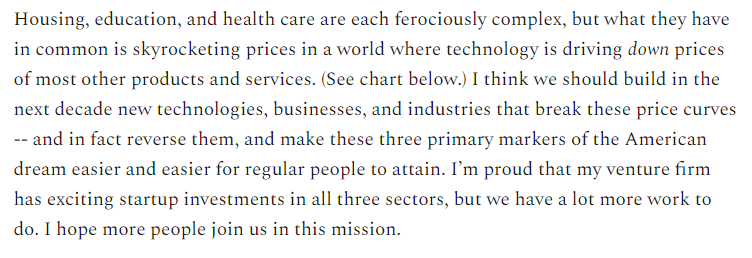2/Most interviews I do are back-and-forth, but this one was just me sending him a list of 10 questions, so I didn't respond in the interview itself! So here are some responses.
3/I think his libertarian perspective on the pandemic is more right than we'd care to admit (and similar to a point I made here: noahpinion.substack.com/p/climate-chan…).
But it does ignore the incredibly successful Operation Warp Speed, and the extremely fast vaccine rollout under Biden.
But it does ignore the incredibly successful Operation Warp Speed, and the extremely fast vaccine rollout under Biden.

4/His idea that technology needs to drive down the prices of big-ticket service sector items is interesting (and similar to @elidourado's post here: medium.com/cgo-benchmark/…).
But ironically I think that in housing, regulation, not lack of technology, really is the big barrier!
But ironically I think that in housing, regulation, not lack of technology, really is the big barrier!

5/I think he's absolutely right about Substack. I've never seen such a Cambrian explosion of good writing! Not sure if it can last, but it's pretty exhilarating. 

6/Interesting that he's sounding a note of caution on A.I., an area of tech that many techies I know have probably been over-optimistic about. 

8/Marc's economic optimism is...actually warranted! How weird is it to be able to say that, in America? We were so obsessed with the Trump Wars that we overlooked a really solid period of economic progress for regular Americans. 

9/His view of blockchain technology goes in the "I wouldn't ignore this if I were you" category.
He's skeptical of the "Bitcoin as hard money" orthodoxy, and optimistic about blockchain as a general-purpose technology.

He's skeptical of the "Bitcoin as hard money" orthodoxy, and optimistic about blockchain as a general-purpose technology.


10/I really disagree with the "Left=centralized, Right=decentralized" idea here. In terms of the culture wars, it's the Right that's centralized and the Left that's decentralized!
The idea of A.I. as Allende's Project Cybersyn is interesting, but I doubt that's how it works.
The idea of A.I. as Allende's Project Cybersyn is interesting, but I doubt that's how it works.

11/Marc's idea that West Coast VC could eventually usurp much of the big corporate finance function of the East Coast is among his more radical ideas! 

12/His characterization of today's tech industry as a "Navy that acts like a pirate" is pretty spot-on, I think. I see this as an acknowledgment that the "techlash" isn't entirely wrong. 

13/I really like Marc's call for revisiting the ideas of early tech thinkers. For my part, I've been reading a lot of @kevin2kelly! 

15/Marc's characterization of the U.S. government handicapping U.S. private-sector tech in the race against China is going to sound to some folks like libertarian boilerplate, but I really don't think it is.
I think there's a good and important point here...
I think there's a good and important point here...

16/The good and important point is that while government and the private tech sector don't always have the same goals, their fundamental goal of an economically and industrially powerful U.S.A. is well-aligned!
bloomberg.com/opinion/articl…
bloomberg.com/opinion/articl…
17/Finally, I really like Marc's advice against "following your passion". Too often, following your passion is just an excuse for employers to underpay you. Seek fulfillment and interest in your family, your friends, and your hobbies. For your job, get PAID. 

18/Anyway, despite the lack of back-and-forth, this was a really fun and interesting interview, and I hope you enjoy it!
(end)
noahpinion.substack.com/p/interview-ma…
(end)
noahpinion.substack.com/p/interview-ma…
Oh, and here's the obligatory reminder to sign up for my Substack's free email list!
noahpinion.substack.com
noahpinion.substack.com
• • •
Missing some Tweet in this thread? You can try to
force a refresh











